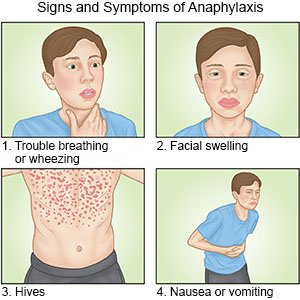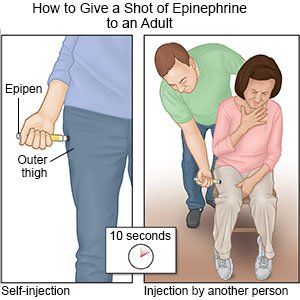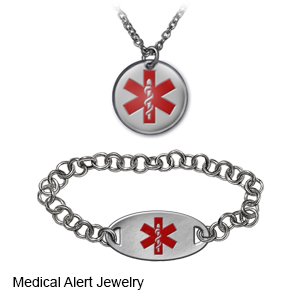Anaphylaxis
Medically reviewed by Drugs.com. Last updated on Apr 2, 2024.
What is anaphylaxis?
Anaphylaxis is a life-threatening allergic reaction that must be treated immediately. Your risk for anaphylaxis increases if you have asthma or allergies. Medical conditions such as heart disease can also increase your risk. It is important to be prepared if you are at risk for anaphylaxis. Your symptoms can be worse each time you are exposed to a trigger.
What may trigger anaphylaxis?
The following are some of the most common triggers:
- Milk, peanuts, tree nuts, eggs, shellfish, wheat, and soy
- Stings from bees, wasps, or fire ants
- Antibiotics, NSAIDs, or aspirin
- Latex
- Exercise following exposure to another trigger, such as after you eat a trigger food
What are the signs and symptoms of anaphylaxis?
You may have any of the following within seconds to hours after exposure to a trigger:
- Trouble breathing, shortness of breath, wheezing, or coughing
- Throat tightening, swelling of the lips or tongue, or trouble swallowing
- Rash, hives, swelling, or itching
- Nausea, vomiting, diarrhea, or abdominal cramps
- Dizziness, lightheadedness, fainting, or confusion
- Sudden behavior changes or irritability
-

How is anaphylaxis diagnosed?
Your healthcare provider will examine you for signs of anaphylaxis. Your provider will ask if you have a history of allergies. Your provider will also ask about exposure to possible triggers and when they occurred. Tell your provider if you take medicines or have any health conditions. You may need more testing if you developed anaphylaxis after you were exposed to a trigger and then exercised. This is called exercise-induced anaphylaxis.
How is anaphylaxis treated?
Your healthcare provider will remove the allergen from you, if possible. You may also need any of the following:
- Epinephrine is medicine used to treat severe allergic reactions such as anaphylaxis. It is given as a shot into the outer thigh muscle.
- Medicines such as antihistamines, steroids, and bronchodilators decrease inflammation, open airways, and make breathing easier.
- Intravenous (IV) fluids may be given to treat low blood pressure caused by anaphylaxis or epinephrine.
- Oxygen may be needed if your blood oxygen level is lower than it should be. You may get oxygen through a mask placed over your nose and mouth or through small tubes placed in your nostrils.
Treatment options
The following list of medications are related to or used in the treatment of this condition.
What steps do I need to take for signs or symptoms of anaphylaxis?
- Immediately give 1 shot of epinephrine only into the outer thigh muscle. Even if your allergic reaction seems mild, it can quickly become anaphylaxis. This may happen even if you had a mild reaction to the allergen in the past. Each exposure can cause a different reaction. Watch for signs and symptoms of anaphylaxis every time you are exposed to a trigger. Be ready to give a shot of epinephrine. It is okay to inject epinephrine through clothing. Just be careful to avoid seams, zippers, or other parts that can prevent the needle from entering your skin.

- Leave the shot in place as directed. Your healthcare provider may recommend you leave it in place for up to 10 seconds before you remove it. This helps make sure all of the epinephrine is delivered.
- Call your local emergency number and go to the emergency department, even if the shot improved your symptoms. Do not drive yourself. Bring the used epinephrine shot with you.
What safety precautions do I need to take?
- Keep 2 shots of epinephrine with you at all times. You may need a second shot, because epinephrine only works for about 20 minutes and symptoms may return. Your healthcare provider can show you and family members how to give the shot. Check the expiration date every month and replace it before it expires.
- Create an action plan. Your provider can help you create a written plan that explains the allergy and an emergency plan to treat a reaction. The plan explains when to give a second epinephrine shot if symptoms return or do not improve after the first. Give copies of the action plan and emergency instructions to family members, and work or school staff. Show them how to give a shot of epinephrine in case you are not able to give it to yourself.
- Be careful when you exercise. If you have had exercise-induced anaphylaxis, do not exercise right after you eat. Stop exercising right away if you start to develop any signs or symptoms of anaphylaxis. You may first feel tired, warm, or have itchy skin. Hives, swelling, and severe breathing problems may develop if you continue to exercise.
- Carry medical alert identification. Wear medical alert jewelry or carry a card that explains the allergy. Ask your provider where to get these items.

- Identify and avoid known triggers. Read food labels for ingredients. Look for triggers in your environment.
- Ask about treatments to prevent anaphylaxis. You may need allergy shots or other medicines to treat allergies.
Call your local emergency number (911 in the US) if:
- You have a skin rash, hives, swelling, or itching.
- You have trouble breathing, shortness of breath, wheezing, or coughing.
- Your throat tightens or your lips or tongue swell.
- You have difficulty swallowing or speaking.
- You are dizzy, lightheaded, confused, or feel like you are going to faint.
- You have nausea, diarrhea, or abdominal cramps, or you are vomiting.
When should I seek immediate care?
- Signs or symptoms of anaphylaxis return.
When should I call my doctor?
- You have questions or concerns about your condition or care.
Care Agreement
You have the right to help plan your care. Learn about your health condition and how it may be treated. Discuss treatment options with your healthcare providers to decide what care you want to receive. You always have the right to refuse treatment. The above information is an educational aid only. It is not intended as medical advice for individual conditions or treatments. Talk to your doctor, nurse or pharmacist before following any medical regimen to see if it is safe and effective for you.© Copyright Merative 2024 Information is for End User's use only and may not be sold, redistributed or otherwise used for commercial purposes.
Learn more about Anaphylaxis
Treatment options
Care guides
Symptoms and treatments
Medicine.com guides (external)
Further information
Always consult your healthcare provider to ensure the information displayed on this page applies to your personal circumstances.
